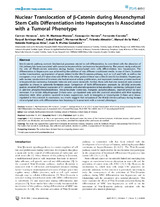Nuclear Translocation of b-Catenin during Mesenchymal Stem Cells Differentiation into Hepatocytes Is Associated with a Tumoral Phenotype

Ver/
Autor
Herencia, Carmen
Martínez-Moreno, Julio M.
Herrera, Concepción
Corrales, Fernando J.
Santiago-Mora, Raquel
Espejo, Isabel
Barcos, Montserrat
Almadén Peña, Yolanda
Mata, Manuel de la
Rodríguez-Ariza, Antonio
Muñoz-Castañeda, Juan R.
Editor
Public Libray of Science (PLOS)Fecha
2012Materia
Hepatocellular carcinomaHepatoblastoma
Wnt/b-catenin
METS:
Mostrar el registro METSPREMIS:
Mostrar el registro PREMISMetadatos
Mostrar el registro completo del ítemResumen
Wnt/b-catenin pathway controls biochemical processes related to cell differentiation. In committed cells the alteration of
this pathway has been associated with tumors as hepatocellular carcinoma or hepatoblastoma. The present study evaluated
the role of Wnt/b-catenin activation during human mesenchymal stem cells differentiation into hepatocytes. The
differentiation to hepatocytes was achieved by the addition of two different conditioned media. In one of them, b-catenin
nuclear translocation, up-regulation of genes related to the Wnt/b-catenin pathway, such as Lrp5 and Fzd3, as well as the
oncogenes c-myc and p53 were observed. While in the other protocol there was a Wnt/b-catenin inactivation. Hepatocytes
with nuclear translocation of b-catenin also had abnormal cellular proliferation, and expressed membrane proteins involved
in hepatocellular carcinoma, metastatic behavior and cancer stem cells. Further, these cells had also increased auto-renewal
capability as shown in spheroids formation assay. Comparison of both differentiation protocols by 2D-DIGE proteomic
analysis revealed differential expression of 11 proteins with altered expression in hepatocellular carcinoma. Cathepsin B and
D, adenine phosphoribosyltransferase, triosephosphate isomerase, inorganic pyrophosphatase, peptidyl-prolyl cis-trans
isomerase A or lactate dehydrogenase b-chain were up-regulated only with the protocol associated with Wnt signaling
activation while other proteins involved in tumor suppression, such as transgelin or tropomyosin b-chain were downregulated
in this protocol. In conclusion, our results suggest that activation of the Wnt/b-catenin pathway during human
mesenchymal stem cells differentiation into hepatocytes is associated with a tumoral phenotype
